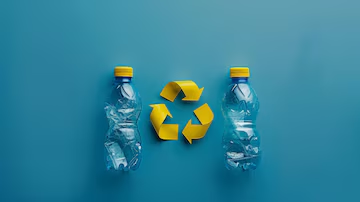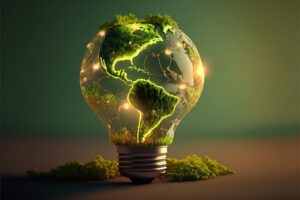The environmental challenges facing our planet are increasing, from the overflowing of landfills to the depletion of natural resources. Advanced recycling technology has revolutionised how we manage waste and protect the environment. Innovative solutions transform discarded materials and reduce our ecological footprint. Modern recycling technology is essential to a sustainable future.
Improved Waste Management
Modern recycling technology is revolutionising the way communities manage their waste. Advanced sorting systems utilise artificial intelligence and optical sensors to efficiently separate plastics, metals, and paper like never before. These automated systems are capable of processing thousands of tonnes per day, reducing the amount of recyclable material that ends up in landfills.
Smart waste management platforms track recycling rates live, helping municipalities to optimise collection routes and identify areas that need improvement. Chemical recycling can now degrade complex plastics, which traditional methods could not handle. This allows previously non-recyclable products to be turned into raw materials. The technological advance allows communities to divert more waste away from landfills while also creating cleaner and more organised waste management.
Resource Conservation
Recycling plays an important role in protecting Earth’s finite resources for future generations. Recycling technology can extract valuable metals from electronic waste. These include gold, silver and rare earth elements. Modern paper recycling technologies can process materials more than once without significant quality losses, reducing the requirement to harvest virgin forest.
Innovative plastic recycling techniques have made it possible to produce high-quality items using recycled materials. The performance of these products is comparable to those derived from new resources. This technological advancement allows manufacturers to rely less on extracting materials from the environment. It preserves natural habitats and reduces environmental impacts. The water recycling technology has advanced in a significant way, allowing communities and industries to reuse wastewater and treat it for irrigation. The practice conserves freshwater, which is becoming scarcer and scarcer around the world.
Pollution Reduction
Modern recycling techniques reduce pollution in various ways that are harmful to the environment and our health. Sophisticated filtration systems equip modern recycling facilities to reduce air pollution. This makes recycling cleaner than ever. Ocean cleanup technologies remove plastic waste from marine environments, converting them into useful materials. The result helps restore marine ecosystems and prevents further contamination.
Chemical recycling processes degrade plastics without emitting harmful toxins, unlike traditional disposal methods, which generate dangerous emissions. Recycling technology reduces soil contamination by preventing hazardous materials from entering landfills, where they could leach into the groundwater system. The electronic waste recycling technology removes harmful substances such as lead and mercury safely from discarded electronics, preventing them from contaminating our environment. This pollution reduction creates healthier communities and protects wildlife habitats.
Energy Efficiency
Recycling has become an incredibly energy-efficient technology, requiring less energy to produce new materials than the production of raw materials. Recycling materials to make aluminium uses 95% less than bauxite ore. Recycled paper is 60% more energy efficient than paper made from virgin wood pulp.
Modern recycling facilities use solar panels and windmills to reduce their carbon footprint. Modern recycling plants use advanced heating and cooling systems to optimise energy consumption throughout the entire processing cycle. This minimises waste and maximises efficiency. Some recycling technologies can even produce energy as a side product by converting organic waste to biogas, which can be used to power homes and businesses. Energy recovery systems use heat produced during recycling to power other devices. They create closed-loop, resource-efficient systems.
Economic Benefits
Recycling technology has many economic benefits that go beyond protecting the environment. It creates jobs and generates revenue for local communities around the world. The recycling industries provide employment for millions of people in roles such as manufacturing, collection and processing, research, and even research. Such activity has a significant impact on local economies. Advanced recycling facilities need skilled technicians, engineers, and operators to create well-paying jobs that support families and communities.
Recycling technology can save companies money through lower raw material costs and waste disposal fees. Recycling technology, which enables a circular economy, creates business opportunities ranging from innovative product designs to waste-to-energy ventures. Export markets for recycled material provide countries with advanced recycling infrastructure additional revenue streams. Government incentives to encourage the adoption of recycling technologies help businesses reduce their initial investment costs while also promoting environmental responsibility. This creates a win-win situation for both economic growth and environmental protection.
Innovation for a Sustainable Future
Recycling is one of the most powerful tools we have to create a more sustainable and cleaner planet. These innovations address multiple environmental issues simultaneously and provide significant economic benefits for communities around the world, ranging from improved waste management to pollution reductions.
Energy-efficient operations and advanced recycling processes help preserve Earth’s ecosystems, while conserving natural resources helps preserve Earth for future generations. Recycling technology will continue to improve, bringing us greater environmental benefits as well as more efficient solutions for our waste management problems. It is important to embrace these technologies and support their development in order to build a sustainable, prosperous future that combines economic prosperity with environmental protection.
FAQs
1. What materials can be recycled using modern recycling technology?
The latest recycling technologies can handle a variety of materials, such as complex plastics and electronic components. They also work with textiles, organic waste, construction materials, or even textiles. Some systems are capable of processing materials that were once considered unrecyclable.
2. What is the role of recycling in reducing greenhouse gas emissions?
Recycling reduces emissions because it requires less energy to produce new materials. It also prevents methane from being released into landfills and avoids the carbon footprint that comes with extracting virgin resources.
3. Does recycling technology make sense for communities and businesses?
Recycling technology can provide long-term savings through lower waste disposal fees, reduced raw material costs and the potential for revenue from recycling materials. However, initial setup costs are often significant.
4. What is the role of artificial intelligence in modern recycling?
AI is used to power advanced sorting systems, which can accurately identify and separate materials, maximise processing efficiency and predict maintenance requirements, minimising downtime at recycling facilities.
5. What can individuals do to support recycling initiatives?
People can help by sorting their waste properly, buying products made of recycled materials, advocating improved recycling programmes in communities and being informed about recycling.




